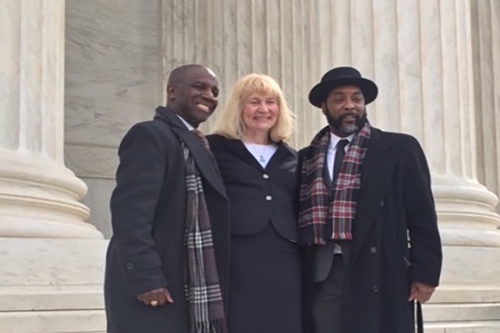At contention in Flowers v. Mississippi is whether Evans intentionally excluded African Americans from jury service, in violation of the 1986 Supreme Court ruling in Batson v. Kentucky, which deemed racial discrimination in jury selection unconstitutional.
Johnson says she is grateful that the Supreme Court agreed to review the decision, and that “the justices so obviously were concerned with the evidence of racial discrimination.” She adds, “Mr. Flowers has spent twenty-two years in prison for a crime he did not commit, in large part because a prosecutor was unwilling to play by the rules and permit a fair hearing of the evidence against Mr. Flowers. I am hopeful that justice, though delayed, will not be denied to Mr. Flowers.”
Johnson, the James and Mark Flanagan Professor of Law, has worked on the case since 2011, when Mississippi lawyer David Voisin asked her and fellow Cornell Law faculty member Keir Weyble, Clinical Professor of Law and Director of Death Penalty Litigation, to become involved because of their prior litigation and scholarship on race and jury selection.
As Johnson and Weyble note in their brief to the Supreme Court, the first four times Evans prosecuted Flowers, he struck every African-American panelist he could, thirty-six in all. At two of those trials, he was found to have discriminated in his use of peremptory challenges. “The record and prior court decisions reveal that throughout the proceedings Evans disregarded established rules of fundamental fairness and was firmly committed to seating as few black jurors as possible,” they write.
Convictions resulting from the first three trials were reversed on appeal, the first two for willful, repeated misconduct during trial, and the third for intentionally excluding African Americans from jury service. The fourth and fifth trials resulted in mistrials.
During jury selection for the sixth trial, Evans accepted the first black panelist, then struck the remaining five. When Flowers appealed the conviction resulting from this trial, the Mississippi Supreme Court rejected his Batson claim, accepting Evans’ stated race-neutral reasons for each of his strikes.
“It is important that lower courts understand that the inquiry under Batson v. Kentucky is not limited to whether a prosecutor can state race-neutral reasons but requires consideration of all of the facts to determine whether race motivated the exercise of his peremptory challenges,” says Johnson. “In this case in particular, a prosecutor’s history of previously violating the constitution and dishonestly reporting the reasons for his strikes is a fact that has to be considered when evaluating whether a prosecutor’s stated reasons are pretextual.”
In their brief, Johnson and Weyble emphasize that the prohibition against racial discrimination in jury selection provides important protections for the rights of both defendants and jurors, and that it prevents the undermining of public confidence in the criminal justice system. They write, “All of those values were diminished by the Mississippi Supreme Court’s perfunctory treatment of the evidence of discrimination in this case.”
